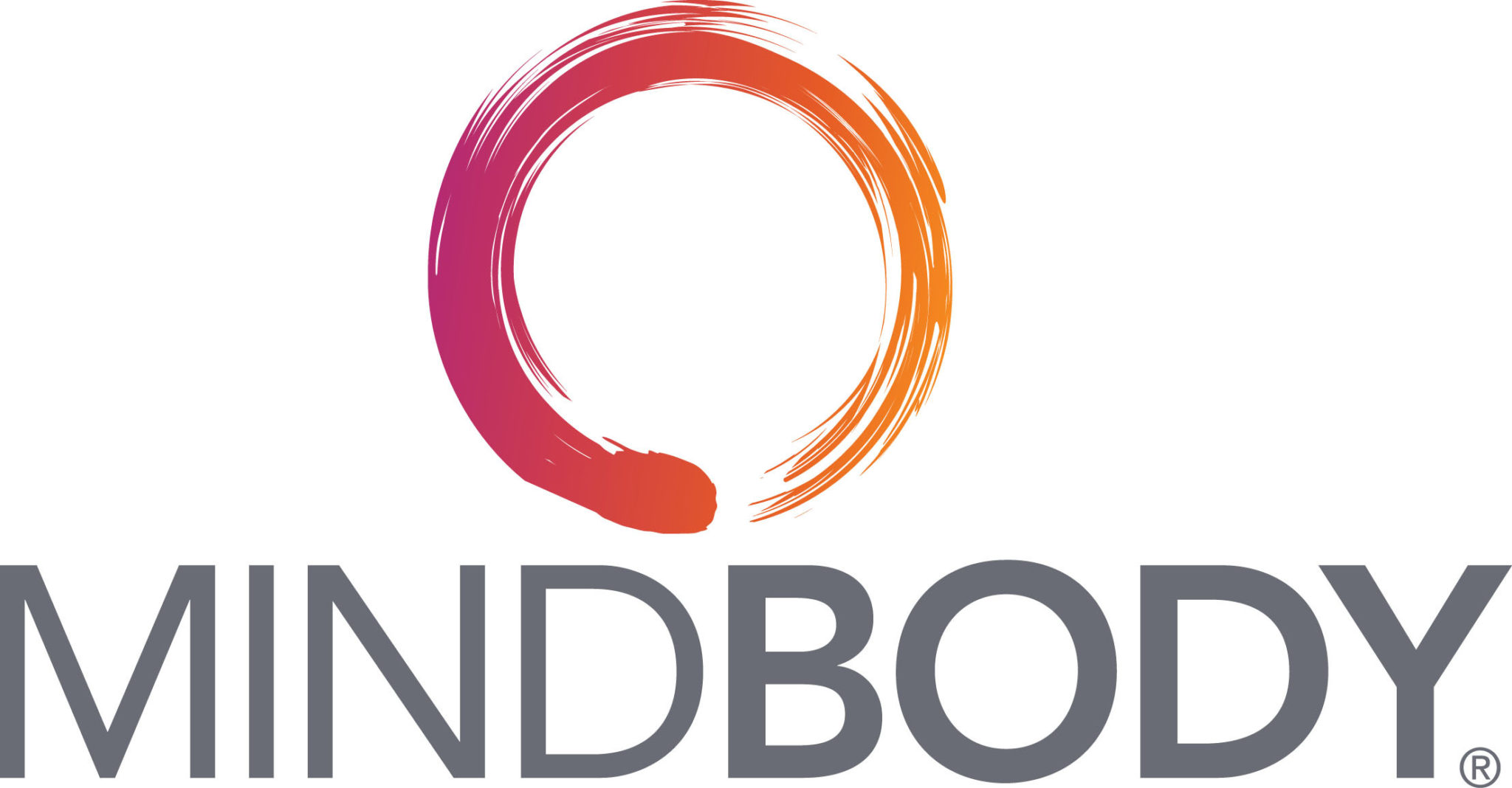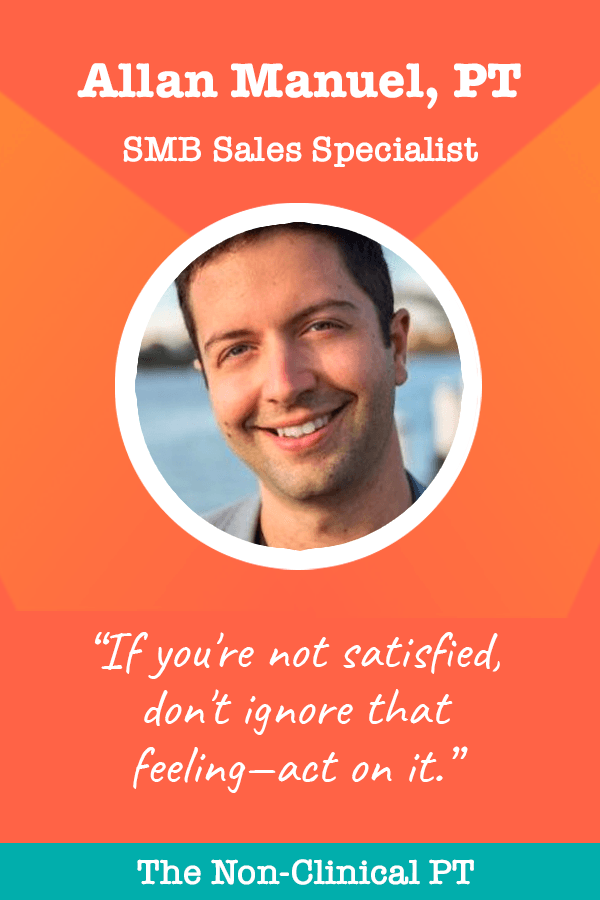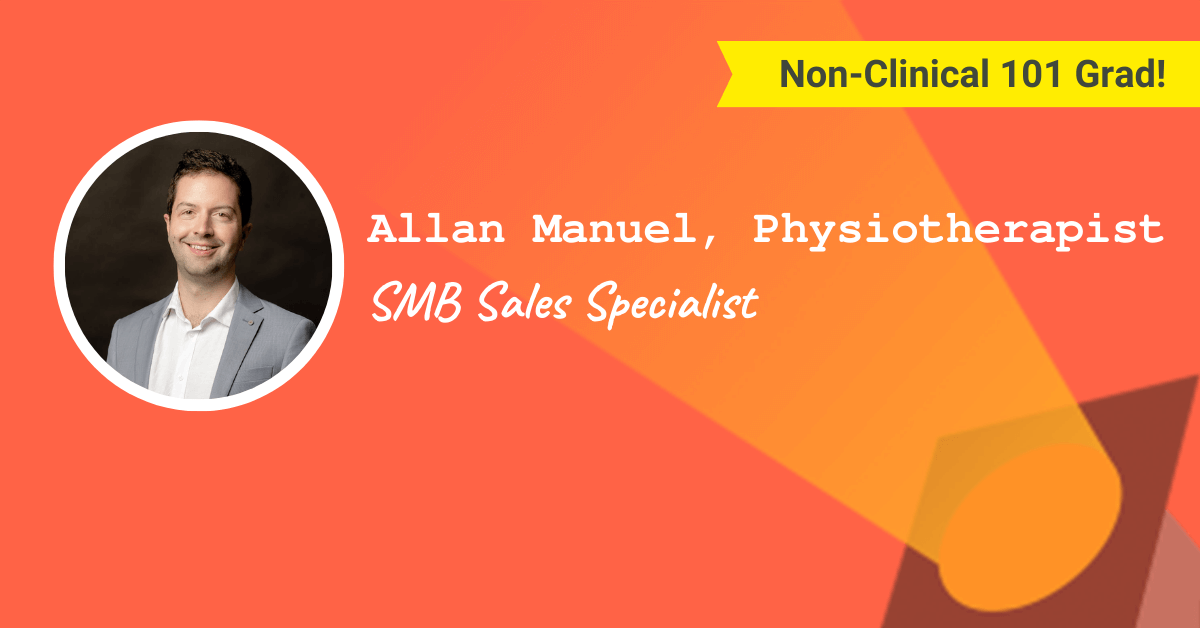Today’s non-clinical spotlight focuses on Allan Manuel, a physical therapist who now works as a SMB sales specialist!
This post may contain affiliate links or codes. This won’t increase your cost, but it helps keep TNCPT alive, and free of annoying ads! Thank you for your support. 🙂
What is your full name and title at your current job?
Allan Manuel – Physiotherapist
SMB Sales Specialist at MINDBODY

What does “SMB” stand for?
Small- and medium-sized business
Where did you go to PT school, and what year did you graduate?
I went to University of Sydney in Australia and graduated in 2010.
What did you do when you first finished school, and for how long?
I was lucky to get accepted into a “first-year grad” role working across a range of hospital departments. This was a contracted role for a year that included living in the outback and working alongside nurses, doctors, and other allied health practitioners.
The highlight was learning from a senior physician how to treat vertigo (caused by BPPV) using the Dix Hallpike maneuver.
Most importantly, that year I spent treating patients taught me how to work and collaborate cross-functionally to achieve great outcomes.
When did you realize you wanted to do something non-clinical, and why?
Soon after my first year in the hospital, I joined a private practice (as is common for most Aussie PTs). I was blessed to be working alongside some amazing specialist physiotherapists.
However after my 4th year out, I noticed my learning curve started to plateau, and I felt like I was just going through the motions. My quarter-life crisis came on strong, and I began asking all these existential questions.
I always had an entrepreneurial itch that I wasn’t sure working as PT could satisfy. As Steve Jobs puts it, I “wanted to make a dent in the universe,” and I began to question whether seeing 15 patients a day was going to do it.
The option of pursuing a post-graduate degree in PT would set me back $30k, and I was already paying off my loans from my undergraduate.
As much as I wanted to continue to learn, the opportunity cost and financials didn’t add up. As I’m sure is the case around the world, additional studies in PT aren’t directly associated with an increase in salary.
My gut was telling me this would delay the inevitable career fatigue that was creeping in. As Meredith points out, it’s easy to fall into the sunken cost fallacy.
My realisations around my 4th year working as a PT were:
- Clinical PT is not a scalable business model – In other words, there’s a ceiling effect on how many people you can see per day, and therefore a cap on how much value you add to the world.
- Full-time PT can lead to compassion fatigue – I needed two part-time jobs from different businesses to keep “fresh” and not burn-out.
Some PTs get defensive when I say this—but I only speak for myself. My personality type is very much entrepreneurial, so I get bored when I’m not overachieving.
However, I wouldn’t change anything if I had the chance. If there’s a recession and all the sales jobs dry up, people are still going to have sore backs! PT is a trade that stays with you for life, which means you’ll never be on the streets.
What are you doing these days?
I’m currently selling software to PTs! It’s great because I can act as a consultant since I know physios’ pain points and can speak their language.
Working for MINDBODY in Sydney has huge potential since our APAC HQ is here. The opportunity was too good to turn down.
I did the startup circuit for seven years, but opted for a career which was performance-based, more stable, and had strong growth potential (health tech will continue to boom in the coming decades).
Are you still treating patients, or are you solely non-clinical?
Yes—I work a few hours a week at a local clinic on my Saturdays. This helps keep my qualification current, but I also find I enjoy the hands-on work more, now that I’m not totally immersed in it.
It’s a great clinic and I’m enjoying myself.
When you step away from the grind, you get a greater appreciation of difference PT can make in people’s lives.
If you’re still treating patients, about what percentage of your time is spent clinically vs. non-clinically?
I’ve got a background in digital marketing so I spend about 50% of the time working on the clinic’s digital presence vs. hands-on treatment when I’m there.
How long have you been in your current role?
Still pretty green; I’ve only been with MINDBODY seven months, but I’m really loving it. MINDBODY respects the domain expertise that comes with being a PT. There’s huge value you can provide! If you’re in the LA/London/Sydney region, I’d recommend applying for a position.
Alternatively, you can get in touch with me, and I’d be happy to provide any insights!
[Editor’s note: Allan was kind enough to shoot an incredibly in-depth video of how to get into sales, which you can access as bonus content in Non-Clinical 101]
How did you find your SMB Sales Specialist job? Did you apply or find it through a connection?
I became aware of MINDBODY through my previous job, and I knew the company was in a prime position to expand in APAC. I read the job description on Seek (an Australian job site), and as soon as I read it, it was like a glove that fit perfectly.
Did you do anything special to your resume and cover letter to land the job?
I did Meredith’s Non Clinical 101 course, which gave me amazing advice on tailoring my resume to showcase all the transferrable skills I had acquired as a PT. Plus, my background in tech and previous experience in sales certainly helped!
Did you get any special certifications or training along the way to help you get into your current role?
My certification was the school of hard knocks! I burned around $40k out of my own personal savings building two startups. I justify that as my “personal MBA,” which helps me sleep at night. The learnings were massive from that. That experience taught me that sales was in my DNA.
So, would you say that experience is the best teacher?
Yes and no. Honestly, going through a PT degree and seeing patients provided more than enough certification and training. It helped with my problem solving and ability to think critically, and it fostered discipline.
On top of that, working in private practice was all about selling. It was your job to educate the patient, and convince them why they had to continue to come back for more treatments. To be a great physio, you not only needed to be an excellent clinician—you also needed to be a great salesperson.
When you say you realized sales was in your DNA, how could you tell?
I’ve also always had an affinity for sales, but hadn’t really used it outside the clinic. And I was already looking at going non-clinical.
But I’m also usually the guy who looks for shortcuts. I couldn’t think of anything worse than going back to school, getting another degree, and racking up more debt. So I knew that I didn’t want to pursue any roles where I’d need more expensive and time-consuming education.

You mentioned the startup circuit and having sales experience. How did you initially get your start in sales?
One day, I attended a startup event hosted at Google HQ in Sydney. I met a serial entrepreneur who mentioned if you wanted to be part of a great company you had to provide exceptional value—if you weren’t good at programming, then you had better be amazing at sales/marketing.
I felt that because I had worked at the coal-face for years, I had built up strong sales skills, which gave me a good base. This was my ‘ah-ha’ moment. (Editor’s note: I had to ask our Aussie friend what “coal-face” meant! He said it’s like working “on the front lines.”) 🙂 I realized that my background in PT had given me baseline sales skills, but I needed to hone them to make them exceptionally valuable in a new setting.
So, I went to work. Over the next two years, I took online courses about sales, listened to hours of audiobooks, attended 10-week intensive after-hours courses, networked at events, and volunteered my services at local startups.
Over the course of a couple years, while still working as a PT, I began to upskill and was starting to bring in business for companies I represented.
If you advanced through the company to get to where you are, what are some of the things you did to stand out, take initiative, and advance?
We have a presidents’ club whereby the leading reps around the globe compete for a luxury holiday (all expenses paid). I benchmark myself against these top performers. So, for me, hitting my quota is the bare-minimum I’m aiming for. I really just strive to set high standards for myself.
Is there anything special you’d advise to those new to the business or sales world?
Get in early and help others around you succeed. I recently received some of the best career advice: if you want opportunities to grow, make yourself dispensable—while still bringing exceptional value to the company. The reason I say to make yourself dispensable (which is counterintuitive) is you make yourself indispensable, you’ll never get a promotion because you are too valuable in that particular position.
Instead, teach and coach others around you and make sure your position can be filled easily. Most people have this the other way around!
How have people reacted to you leaving patient care?
Whenever you make a career change, there will always be resistance, whether it’s from well-meaning family members, friends or colleagues.
I’ve found that if you’re transparent and honest, people understand. I admire the PT profession, and have so much respect for my colleagues. But, over the long term, it simply wasn’t for me. I was fortunate enough to flag this lingering unease early-on, and could gradually transition out by the time I was 30.
I try not to react to people’s judgement and just acknowledge what they say. Usually it comes from a place of insecurity, and has nothing to do with you. Most healthy, balanced people will wish you well.
What are some of the challenges of your role? What are the rewards?
The hardest part is the cold calling. Nobody likes it, but if you want to be a top-performing rep, you need to master this skill and suck it up. Thankfully, MINDBODY has a strong cold-calling culture and an excellent training program to give you a head start.
How do you think working as a physio prepared you for this role? Which skills transferred?
It helped immensely! You’re much more experienced than you believe. Working as a PT helped build:
- Empathy
- Communication skills
- The ability to thrive in stressful scenarios
- Critical thinking skills
These are all essential if you want to dominate sales or a customer-facing role. Me being a PT/physio gives me credibility when speaking to my prospects, too.
Roughly speaking, how are the hours and pay compared to patient care?
Significantly better, but it’s performance-based—so, you only get out what you put in.
What type of person do you think would do well in your role?
The best reps think of themselves as consultants, rather than sales people. They are intelligent and able to problem-solve to help their clients specific needs.
This is exactly what PTs/OTs do every day. The one trait I would say is you need to have grit. Your ability to pick yourself back up and have resilience is the most important trait.
When a customer says “I’m not interested,” but you know your solution will help their business, you need to keep pushing.
How did you learn the skills you need to successfully sell?
I believe many PTs already have the skills to sell. I consolidated these skills by volunteering for other startups, doing courses and meeting mentors.
I learnt from mentors who work in sales as investment bankers, work from home running their own e-commerce businesses, or even from property investors. They helped point me in the right direction.
Going at this alone won’t help—there are plenty of shortcuts to be taken and people who are far more experienced than you. Instead of trying to reinvent the wheel, sort these people out and find out if there’s any way you can help them in return (note: some of these may be your patients!).
Do you work remotely or on-site?
I have the ability to do both, but I find I’m more motivated around my colleagues.
Does your organization hire PT, OT, or SLP professionals into non-clinical roles? If so, what type of roles, and where can people find these job postings?
Yes! MINDBODY hires for customer service, sales, account executive/manager, and customer success roles. Check out our careers page here: https://company.mindbodyonline.com/careers
Did you read any books, take any courses, or do anything special overall to get you where you are today?
I’m addicted to Audible and usually listen to 2-3 books a book while commuting to work.
Favourite books are:
- Zero to One (Peter Thiel) – amazing book about creating a truly valuable business
- The Go-Giver (John Mann, Bob Burg) – A parable about giving value before asking. This book changed my life.
- Fanatical Prospecting by Jeb Blount – The best sales book I’ve ever read. Hands down.
I also completed a 10-week part-time General Assembly course that taught me all about digital marketing and sales. This was fantastic, and really gave me practical skills outside of PT. After this course, I felt I could provide enough value to volunteer for the startups I mentioned earlier.
Pro Tip: As long as you have a solid use case, try to get your boss cover the fees for any professional-development courses.
→ Learn more about General Assembly and other non-clinical coursework in this article!←

What is a typical career path for someone in your role?
If you’re an amazing sales rep, there are many routes. You can become a leader managing people, or you can take on more strategic accounts. It’s really up to you and your strengths/goals.
Did you get any guilt or weird reactions to your decision to move in a different direction? If so, how have you handled people’s judgment?
Whenever you make a career change, there will always be resistance. Whether it’s from well-meaning family members, friends or colleagues.
I’ve found that if you’re transparent and honest, people understand.
I admire the PT profession, and have so much respect for my colleagues. But over the long term, it simply wasn’t for me. I was fortunate enough to flag this lingering unease early-on, and could gradually transition out by the time I was 30.
I try not to react to people’s judgement, and instead just acknowledge what they say. Usually the negative comments come from a place of insecurity, and have nothing to do with you. Most healthy, balanced people will wish you well.
What is next for you? What do you want to do with your career long-term?
I’ll continue to work at MINDBODY and aim to build my career here. I am still passionate about startups, and might look back into the scene when I have some more capital under my belt in a decade or so. I loved working for Blys (Australia’s Uber for Massage).
I’m very keen on following Meredith’s journey and helping her out whenever possible because she is truly making the world a better place for us health professionals. How amazing is this community she has built?!
What would you recommend to someone who is considering going into a role like yours?
Reframe your past PT experience to show your experience in sales.
What would you like to change most in your profession, and why? How would you propose doing so?
I wish the sales profession actually listened to their prospects and focused less on their product. Sales would have a much better reputation if the reps actually listened and framed the conversation around WIIFM (what’s in it for me, meaning what is in it for the prospects).
Regarding the PT profession: we need to look at practitioner churn and understand why the attrition rate is so high, with PTs leaving the field within five to 10 years.
PTs are some of the most intelligent, hard working people I’ve met. Greater recognition at the top would help drive more clear-cut career paths and gain greater public recognition, which would enable PTs to have better financial freedom. Policy changes are needed at the top for this to happen. If you look at the rates the government pays some lawyers and financial analysts, compared to what they pay PTs…it’s insane! Especially because PTs are arguably providing greater value to society.
If you could give yourself one piece of career advice you wish you had during your PT school program, what would it be?
Volunteer more at growing organisations.
If you could teach anything to today’s graduate students in your profession, what would it be?
If you’re not satisfied, don’t ignore that feeling—act on it. I’d teach the importance of finding what work you were made to do. A good start is the 16 personalities test. Also, Non-Clinical 101 delves deep into what’s right for you beyond patient care!
Alan has generously recorded an informative video where he shares answers to your burning questions about sales (as polled in the Non-Clinical Networking Group)—and it’s available exclusively as a bonus video in Non-Clinical 101! Just log into the course and look in the bonus section to learn more about salaries, gaining experience, and career growth in sales. And, if you watch to the end of the video, he has a completely awesome and free (no strings attached and no sales pitches) pay-it-forward offer for Non-Clinical 101 students!
Do you have any special advice for others who want to follow in your footsteps?
It’s all about the long game. You’ll need to make some short-term sacrifices, but the happiness and job satisfaction you’ll gain from listening to your gut will be worth it. Develop a plan to transition out and keep your PT job for as long as you can afford to, even if it means going part-time for a while.
You’ve arrived at this site for a reason; let us spur you onto your next great adventure 🙂
Thanks for your insight, Allan!





